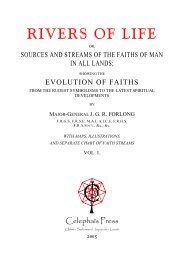Dutch Fairy Tales by William Elliot Griffis.pdf
Dutch Fairy Tales by William Elliot Griffis.pdf
Dutch Fairy Tales by William Elliot Griffis.pdf
You also want an ePaper? Increase the reach of your titles
YUMPU automatically turns print PDFs into web optimized ePapers that Google loves.
<strong>Dutch</strong> <strong>Fairy</strong> <strong>Tales</strong> for Young Folks<br />
noticed that the more people had, the more they wanted. The girls and boys quickly found that money would<br />
buy what the pedlars brought. In the towns, shops sprang up, in which were many curious things, which<br />
tempted people to buy.<br />
Some tried to spend their money and keep it too—to eat their cake and have it also—but they soon found that<br />
they could not do this. There were still many foolish, as well as wise people, in the land, even during the new<br />
time of money. A few saved their coins and were happy in giving some to the poor and needy. Many fathers<br />
had what was called a “sparpot,” or home savings bank, and taught their children the right use of money. It<br />
began to be the custom for people to have family names, so that a girl was not merely the daughter of<br />
so−and−so, nor a boy the son of a certain father. In the selection of names, those which had the word “penny”<br />
in them proved to be very popular. To keep a coin in the little home bank, without spending it, long enough<br />
for it to gather mould, which it did easily in the damp climate of Holland, that is, to darken and get a crust on<br />
it, was considered a great virtue in the owner. This showed that the owner had a strong mind and power of<br />
self−control. So the name “Schimmelpennig,” or “mouldy penny,” became honorable, because such people<br />
were wise and often kind and good. They did not waste their money, but made good use of it.<br />
On the other hand, were some mean and stingy folks, who liked to hear the coins jingle. Instead of wisely<br />
spending their cash, or trading with it, they hoarded their coins; that is, they hid them away in a stocking, or a<br />
purse, or in a jar, or a cracked cooking pot, that couldn't be used. Often they put it away somewhere in the<br />
chimney, behind a loose brick. Then, at night, when no one was looking, these miserly folks counted, rubbed,<br />
jingled, and gloated over the shining coins and never helped anybody. So there grew up three sorts of people,<br />
called the thrifty, the spendthrifts, and the misers. These last were the meanest and most disliked of all.<br />
Others, again, hid their money away, so as to have some, when sick, or old, and they talked about it. No one<br />
found fault with these, though some laughed and said “a penny in the savings jar makes more noise than when<br />
it is full of gold.” Even when folks got married they were exhorted <strong>by</strong> the minister to save money, “so as to<br />
have something to give to the poor.”<br />
Now when the fairies, that work down underground, heard that the <strong>Dutch</strong> had learned the use of money, and<br />
had even built a mint to stamp the metal, they held a feast to talk over what they should do to help or harm. In<br />
any event, they wanted to have some fun with the mortals above ground.<br />
That has always been the way with kabouters. They are in for fun, first, last, and always. So, with punches and<br />
hammers, they made counterfeit money. Then, in league with the elves, they began also to delude misers and<br />
make them believe that much money makes men happy.<br />
A long time after the mint had been built, two kabouters met to talk over their adventures.<br />
“It is wonderful what fools these creatures called men are,” said the first one. “There's old Vrek. He has been<br />
hoarding coins for the last fifty years. Now, he has a pile of gold in guilders and stivers, but there's hardly<br />
anything of his old self left. His soul is as small as a shrimp. I whispered to him not to let out his money in<br />
trade, but to keep it shut up. His strong box is full to bursting, but what went into the chest has oozed out of<br />
the man. He died, last night, and hardly anybody considers him worth burying. Some one on the street to−day<br />
asked what Vrek had left behind. The answer was 'Nothing—he took it all with him, for he had so little to<br />
take.'“<br />
“That's jolly,” said the older kabouter, who was a wicked looking fellow. “I'll get some fun out of this. To<br />
shrivel up souls will be my business henceforth. There's nothing like this newfangled business of getting<br />
money, that will do it so surely.”<br />
So this ugly old imp went “snooping” around, as the <strong>Dutch</strong> say, about people who sneak and dodge in and out<br />
of places, to which they ought not to go, and in houses where they should not be found. This imp's purpose<br />
THE MOULDY PENNY 56






![[PDF] Prolegomena](https://img.yumpu.com/16774951/1/190x245/pdf-prolegomena.jpg?quality=85)









